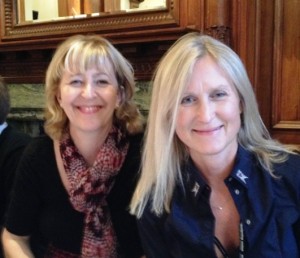
Author and political commentator, Owen Jones, with Accord Coalition Steering Group member and co-Director of the Christian think tank Ekklesia, Simon Barrow.
The Accord Coalition has revealed startling new insight from the Fair Admissions Campaign about the extent to which selection by faith leads to greater socio-economic segregation in England’s state funded school system. The research was set out yesterday (Sunday 21st) at a packed-out fringe meeting that Accord co-hosted at the Labour Party autumn conference with Comprehensive Future, the Socialist Educational Association and the Campaign for State Education, titled ‘Is the Future Comprehensive? Schools for One Nation’.
Accord Coalition Steering Group member and co-Director of the Christian think tank Ekklesia, Simon Barrow, was joined on the panel of speakers at the meeting by Patsy Kane, headteacher of Whalley Range High School in Manchester and Chair of Association of School and College Leader’s Assessment and Curriculum Committee; the author and commentator, Owen Jones, and journalist and education campaigner, Fiona Millar. The meeting was chaired by the writer and campaigner, Melissa Benn.
Simon Barrow told the audience that Accord put forward a moral, educational and practical case against schools selecting children by faith. He argued that pupils being educated with those from different backgrounds helped build a more connected society and that religious selection led to greater socio-economic segregation.
To highlight the extent of this problem he revealed new findings from the Fair Admissions Campaign showing that while grammar schools were found on average twice as socio-economically selective as religiously selective schools, because religiously selective schools were more numerous they make a greater contribution overall in making the state funded school system more socio-economically segregated at the secondary level. The combined impact of socio-economic segregation by religious selection at the primary and secondary phases is twice that caused at grammar schools. Finally, overall, there are more places that can be allotted by faith at state funded schools in England as there are places allocated by academic ability, aptitude or gender, or at private schools, combined.
Mr Barrow objected to children’s life chances being damaged according to their faith or belief background. He said it went against his support for equality and dignity based on his Christian beliefs, and also went against the beliefs of many other people who held differing religious and non-religious life stances. He urged the Labour Party to commit to phasing out selection by faith to state funded schools; to have Ofsted again inspect schools on their contribution towards promoting community cohesion, and to add a broad and balanced Religious Education curriculum to the National Curriculum.
Patsy Kane highlighted the tactics some parents used to get their children into grammar schools and said academic selection of children at age 11 was not justifiable. She argued that it lowered expectations for those children that failed to gain admittance to grammar schools and could lead to siblings being split up. She said comprehensive schools were better at ensuring pupils were stretched and challenged during their schooling, and argued that society could not afford to limit the ambitions of pupils at a young age when children still had great potential to change.
Owen Jones said comprehensive education and schools moving away from selection should be an ideal found at the centre of the Labour Party. He cited a range of sources of inequality in society and labelled educational inequality as inexcusable. He urged that forms of segregation caused by schools should be tackled and described pupil selection by faith as having become a scam. He urged that comprehensive education be viewed as a source of pride and for greater public spending on early years education.
Fiona Millar argued that if the Labour Party was to create a fairer society it needed to address current forms of selection in pupil admissions. She said grammar schools caused nearby schools to have skewed intakes and led many families to ensure their children began being coached for the eleven plus up to four years in advance. She said international rankings indicated that the best school systems were ones that gave schools autonomy, employed high quality teachers and had socially balanced pupil intakes. She urged that parents should be ensured that comprehensive schools were fairer, but also provided a higher quality of education.
The Fair Admissions Campaign was launched in June last year. It has the sole aim of opening up all state-funded schools to children without regard to religion. It hosts an online tool mapping the extent of social and ethnic inclusiveness of all secondary schools in England, along with how religiously selective individual secondary faith schools are.




We don’t believe Any school should be faith related. I don’t believe we should have Church of England schools or catholic schools etc.
in fact, we don’t believe children should be taught RE, other than a few times during school life to enable children to understand about other religions. Other than that, we believe children should be educated about religion by parents at home and church if that’s what the family choose.
This would stop any faith selection altogether and a lot of time in obligatory worship could be done away with. My children who are non believers tell me their Church of England primary school make them pray and teach them RE as though it’s unquestionable as to the existence of God.
There is no place for religion at school in today’s world….other than to briefly teach appreciation for others’ religious beliefs.